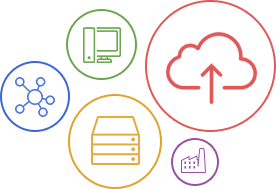
Today’s digital infrastructure has forever changed the way technology is used in business. In this new era of complex device ecosystems, IT services and network management have become significant aspects of information security to be able to stay on top of a plethora of threats. Regular network monitoring is needed to comprehensively check that your network’s capabilities are running optimally. But before we delve deeper, let’s go back to basics.
But first, what is a network?
A network is a group of two or more connected devices or computer systems that work with each other. Think of a network as a collection of interconnected computers, servers, and other devices that allow the sharing of data. Networks can be managed by your in-house IT team or a third-party managed network provider. One great thing about managed network services is that network solutions are usually delivered through a cloud infrastructure service. This means that your network can be managed anywhere, anytime as long as you have a reliable internet connection. Networks are most commonly used for:
- File sharing
- Communications such as email and instant messaging platforms
- Data and resource sharing
- Remote accessibility
What is network management?
Now that we’ve defined what exactly a network is, let’s now talk about network management. According to Cisco, “Network management is the process of administering, managing, and operating a data network, using a network management system. Modern network management systems use software and hardware to constantly collect and analyze data and push out configuration changes for improving performance, reliability, and security.”
What are the different network management processes?
Security management
Security is one of the most important network management processes for any company. It ensures the security of devices and applications while also keeping your business data safe and secure. According to the National Institute of Standards and Technology, security management comprises six subprocesses: policy, awareness, strategy, compliance, access, and monitoring. A network security management plan’s main function is to keep your network system running while protecting your network from natural disasters, power failures, and malicious cyber attacks.
Configuration management
In simple terms, configuration management is a set of processes conducted by administrators to keep systems running correctly and consistently. There is no one-size-fits-all approach when it comes to configuration management as each configuration differs from one company to another. A proper configuration strategy increases a company’s efficiency, minimizes risk, and enhances system and process efficiency through heightened security monitoring and auditing.
Accounting management
Accounting management, according to ScienceDirect, determines the utilization of network services by individuals or groups of users according to available resources, network services that may be apportioned fairly among users while also reducing network congestion. Accounting management is primarily concerned with the documentation of all network usage information primarily for the purpose of cost management.
Performance management
In network management, performance management refers to the methods that manage and ensure that a company’s network is running as best as it could. This involves placing proactive solutions that help identify issues that may affect the performance of the network as a whole. Having a proper performance management plan in place not only keeps your business operations running smoothly but also supports the productivity of end-users.
Data backup and recovery
A backup and disaster recovery plan should form part of every company’s network management plan as it serves as a guide that allows you to restore your data after an unforeseen incident. Having a disaster recovery plan means you can minimize the impact of downtime, speed up recovery, and restore and secure sensitive information.
Should you hire an IT staff or outsource to an MSP?
Outsourced IT services are, more often than not, hired by small to medium-sized businesses that are trying to cut costs, experiencing rapid expansion, or bolstering their IT needs. Having an in-house IT team isn’t a barrier for you to consider hiring managed IT services. In fact, they should complement each other. Think of your in-house IT department as your day-to-day IT support provider while your managed IT service provider can work on more complex IT functions like backup and disaster recovery measures, network management, cybersecurity measures, data management services, as well as server management just to name a few.
There is no single best way to answer this question. The best thing to do is to know your company inside out. Getting the most out of your money depends on how deeply you are invested in your company’s operations, its capabilities, and its needs. It doesn’t matter whether it’s a single IT guy or a whole team of managed service providers; what matters is your needs are adequately met.
Why is network management important? How can network management help your business?
Network management plays an integral role in the day-to-day operations of your organization. With the right plan in place, businesses will be able to ensure that their IT functions are running well and can timely detect software failure, viruses, and other threats. Below are some key reasons why network management is an essential part of your business operations.
- Performance
Performance issues can occur at any time. Through proper network management, you are allowing yourself to focus on much more important things like growing your business. A well-devised network management strategy will ensure that all the critical aspects of your network are monitored. Proactive support should also be readily available in case problems arise. A network maintenance plan, like any other IT function, increases your business’s reliability and ensures peace of mind.
- Cost-effective
Not only can network management improve the efficiency of your business operations, but it can also provide predictable costs and scalable growth. This means that costs will stay the same and would not depend on the general economic situation.
- Connectivity
A well-maintained network ensures that the connectivity between various networks and devices is optimized - making it easy for employees, customers, and other stakeholders to access the necessary data without too much lag time. While it’s true that the time with which data travels depend on the infrastructure you have in place, a great network management system should ensure that your devices are working at their best. A network maintenance plan, like any other IT function, increases your business’s reliability and ensures peace of mind.
- Reliability
Any IT person or managed IT service provider that guarantees 100% service uptime is lying, plain and simple. Even the most powerful network infrastructure wouldn’t be able to help you prevent all network outages. However, putting an excellent network management plan in place would help you preemptively fix problems that may cause future outages.
- Security
Having a holistic approach to securing your infrastructure, your operations, and your assets should be every single business’s priority. A network management strategy, while primarily designed for monitoring purposes, is a great deterrent for most cybersecurity threats. Contrary to popular belief, cyberattacks are preventable issues that you can thwart even before it affects you.
Wrapping Up
We hope that this article highlighted the importance of having a network management plan for your business. If you’re unsure where to start, we’re here to help! Here at ETech 7, our first piece of advice is for businesses to understand their most vital operations and determine if they have the necessary infrastructure in place to support those operations. Understanding your capabilities first allows you to determine what type of technology you need and what type of strategy to put in place. Remember, there is no one-size-fits-all approach when it comes to IT. You have to put in the work and research the strategies that would best meet your needs. For more information, visit www.etech7.com or shoot us an email at info@etech7.com.













